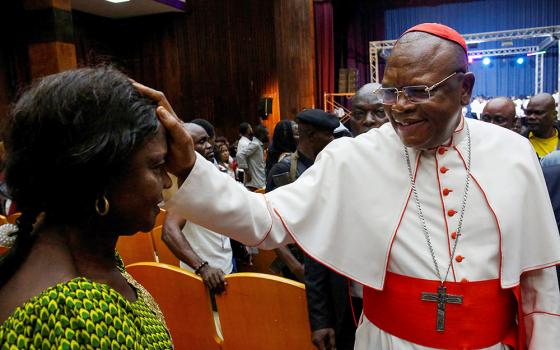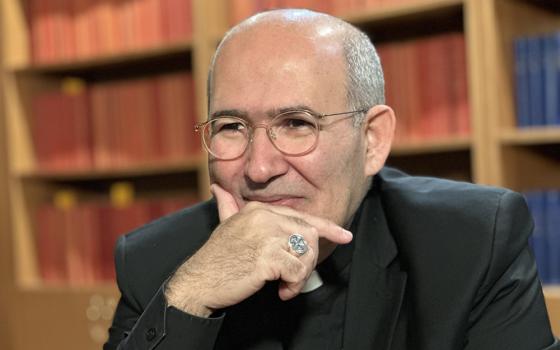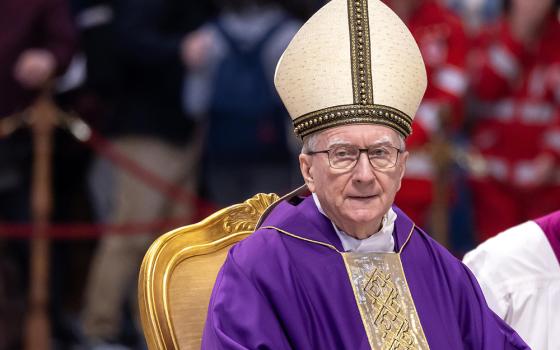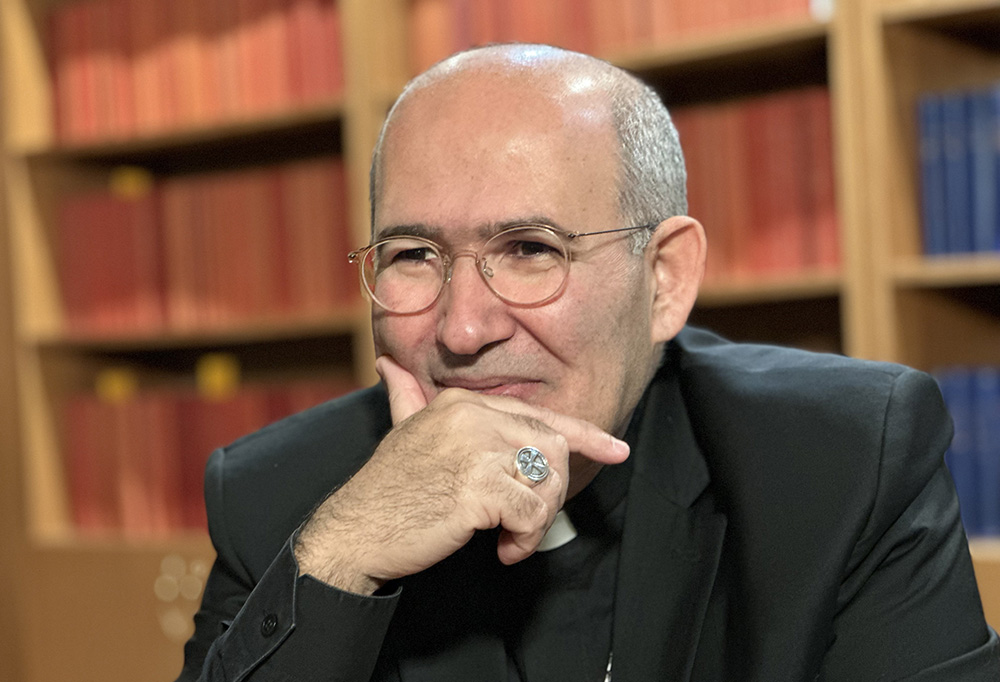
Cardinal José Tolentino de Mendonça, prefect of the Dicastery for Culture and Education, speaks to Catholic News Service for an interview at the Vatican Feb. 14, 2025. (CNS/Robert Duncan)
When Pope Francis gave Portuguese Cardinal José Tolentino de Mendonça the red hat in 2019, Tolentino asked the pontiff, "What did you do to me?"
A smiling pope, Tolentino recalled at a conference in Rome in 2023, answered: "You are poetry."
And it's true. In his native Portugal, the 59-year-old Tolentino is known throughout the country for his heralded poetry and his acclaimed plays, with many avid fans unaware of the fact that he's also a churchman.
Now, as cardinals gather in Rome to select a new pope, the question arises: Could a poet become the next pope?
Born the son of a fisherman on the Portuguese island of Madeira, Tolentino spent the first nine years of his life in the African nation of Angola, at the time a Portuguese colony.
At age 14, Tolentino was a voracious reader and encountered the work of a Portuguese poet-philosopher, Herberto Hélder, who maintained that God was dead because of what Hélder viewed as Catholicism's lack of inspired poetry, music and paintings, Tolentino said.
Tolentino, who later became friends with Hélder, recalled this formative period at the 2023 gathering of artists, and said this encounter was what eventually drew him to ordination to the priesthood. The encounter with Hélder led him to dedicate his life to dialogue.
Advertisement
"When Christianity loses all the capacity to produce new words, new images, new poetry, new music, it will be dead," he told the group of artists.
His poetry and the priesthood evolved hand in hand. He published his first book of poems in 1990, the same year he was ordained a priest of the Funchal Diocese in his native Madeira.
After pursuing graduate work in biblical theology in Rome and Lisbon, Portugal, he held a number of pastoral assignments, including as chaplain of the Portuguese Catholic University in Lisbon.
From 2004 to 2014, he served as the first-ever director of the National Secretariat of the Pastoral of Culture, a center created by the Portuguese Catholic bishops to promote cultural dialogue within the country. In this capacity, in 2011, he was named as a consultor of the Vatican's Pontifical Council for Culture by Pope Benedict XVI. There, he became a close collaborator with its then-head, Italian Cardinal Gianfranco Ravasi.
In 2018, Francis invited Tolentino to lead the annual Lenten retreat for the Roman Curia, a defining moment for Tolentino on the Roman scene. The assignment effectively served as an audition for him in front of the Vatican's top cardinals and bishops — and, of course, the pope.
Vatican commentators and officials alike have agreed that Tolentino may get the church's top spot — but perhaps not in this conclave but the next.
At the time, he expressed shock at the invitation, according to Portuguese news magazine, Visão. Writing on the website of the Portuguese Pastoral of Culture center, Tolentino said that he was only a "poor priest." Tolentino wrote 10 meditations on the theme of thirst, which he used to stress the need for the church's prelates to stay in touch with everyday life.
Francis apparently took note.
Less than six months later, Tolentino was summoned to Rome full time to serve as an archivist and head of the Vatican's library.
A year later, he was elevated to cardinal, and in 2022, he succeeded Ravasi as the head of the newly formed Dicastery for Culture and Education.
Colleagues of the cardinal describe him as an indefatigable worker who puts in long office hours and demands the same of his staff.
His impressive work ethic inside the Vatican, however, hasn't slowed him from churning out his own acclaimed poetry and other literature. In 2023, he was awarded the Pessoa Prize, Portugal's prestigious annual award for significant and innovative contributions in the artistic, literary or scientific life of the country.
One Vatican official told National Catholic Reporter that Tolentino's high standards would be ideal for "whipping the rest of the Roman Curia into shape" and that he combined Francis' emphasis on dialogue and encounter, with the discipline to get the job done.
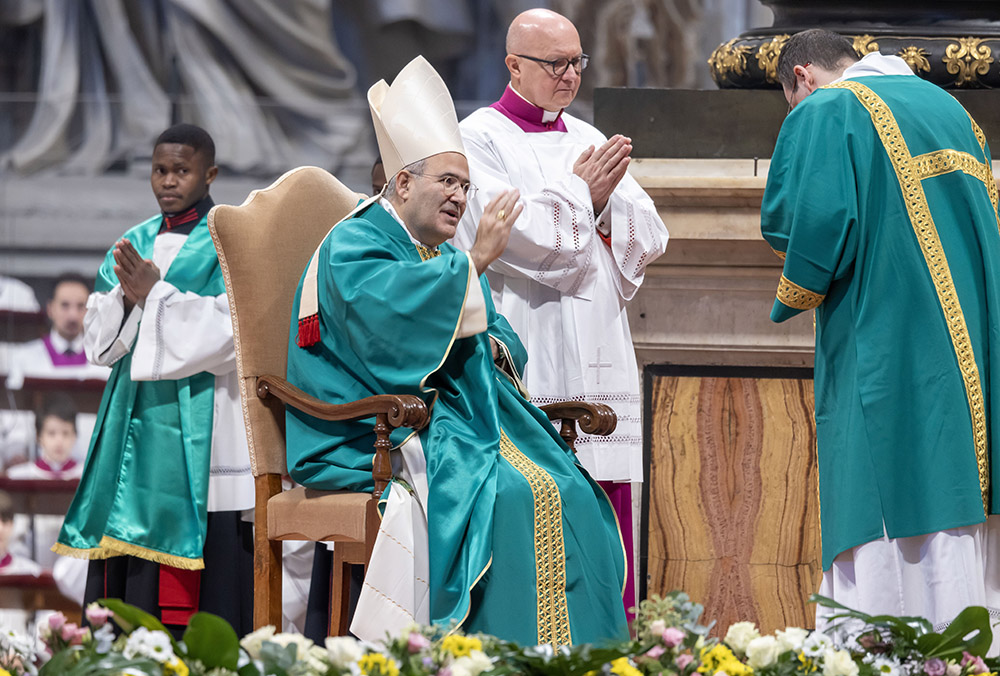
Cardinal José Tolentino de Mendonça celebrates Mass in St. Peter's Basilica for the Jubilee of Artists and the World of Culture at the Vatican Feb. 16, 2025. (CNS/Pablo Esparza)
Born in 1959, Tolentino could be an attractive choice for fellow cardinals eager to elect a younger, vivacious figure as the next pope, one who would likely have several decades to carry out his program. However, his age also could work against him: Some cardinals are wary of giving a lifetime appointment to someone who, in Catholic Church terms, is young.
As his name has been mentioned in the lead-up to the coming election, Vatican commentators and officials alike have agreed that Tolentino may get the church's top spot — but perhaps not in this conclave but the next.
Tolentino is a vowed member of the Third Order of St. Dominic — meaning he is committed to Dominican spirituality but does not possess any official obligations to the Order of Preachers.
Also, he has long been close to the influential Community of Sant'Egidio, a lay-led Catholic social service organization headquartered in Rome. Should the Community of Sant'Egidio's hometown hero, Cardinal Matteo Zuppi, not get the necessary backing to be elected pope, Tolentino could likely become a favorite of other cardinals close to the community.
While Italian members of the College of Cardinals are keen to see the papacy "return to Italy" after three non-Italian popes in a row, Tolentino could prove to be a compromise candidate for Italians. His works have been frequently published in Italian newspapers and are well-regarded.
He's also well-known by the cardinals in Brazil where Tolentino has taught at a number of universities as a visiting professor. Combined with Brazilian backing, it's not difficult to imagine an Italian-Brazilian coalition of support forming behind him and electoral math adding up in his favor.
The son of a fisherman filling the shoes of a fisherman? Poetry indeed.
This is part of a series on the leading candidates in the 2025 papal election. The National Catholic Reporter's Rome Bureau is made possible in part by the generosity of Joan and Bob McGrath.






